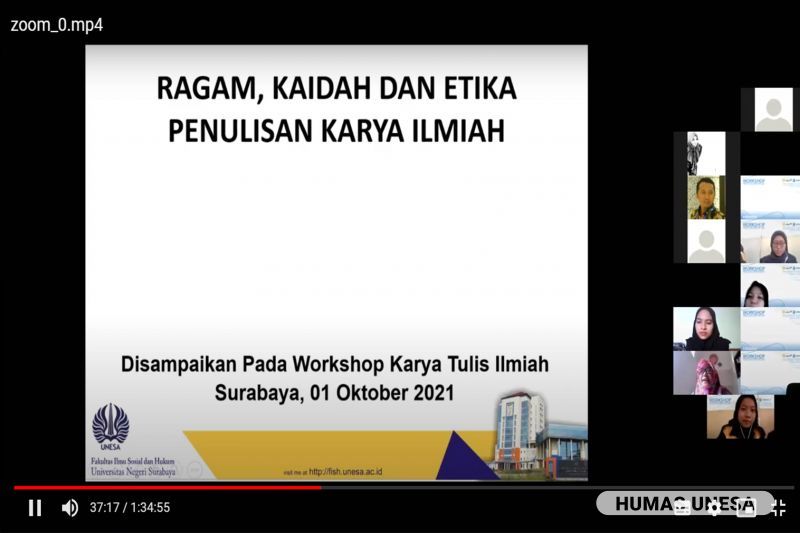
www.unesa.ac.id
Unesa.ac.id, SURABAYA-The UNESA Population Student Activity Unit (UKM) held a Virtual Scientific Writing Workshop entitled "Build Talented Young Generation with a Scientific Papers" on October 1-2, 2021. The activity was followed by students and the general public using a hybrid model. The aim is to provide knowledge about the manufacture of KTI.
As a presenter, Siti Maizul Habibah, S.Pd., M.A., was present as a lecturer in the UNESA Pancasila and Citizenship Education Study Program. The event was opened by the UNESA Population UKM Trustees, namely Ali Imron, S.Sos., M.A. On that occasion, he conveyed about training activities and contracts. There are several things that will be studied in order to build a scientific article that really conforms to scientific standards and procedures. "The output of this activity is scientific articles that are ready to be published in the form of an ISBN volume book," he said.
Siti Maizul Habibah, S.Pd., M.A., explained the variety, rules, and ethics of writing scientific papers. According to him, scientific writings are divided by type and function. For this reason, scientific writing can be distinguished from non-scientific which lies in the systematics of writing. "The criteria for scientific writing must be up-to-date, based on facts, effective and efficient writing, honest, straightforward, not personally motivated, and as a place to convey mutual criticism," he explained.
He continued, the way to gain knowledge in writing scientific papers could be through the scientific method or the non-scientific method. "Well, the indication or special characteristic of scientific method writing is that decision making must be based on correct logic, while non-scientific methods are not based on logical decisions," he explained.
In general, scientific papers have a format consisting of a title, abstract, introduction, literature review, methodology, results and discussion, conclusion, and bibliography. However, the systematics of scientific papers published in the form of anthology have different elements. For the composition of the writing section in KTI, it must be proportional and the application of language style follows the rules of using good and correct Indonesian. "The content in KTI is that the results and discussions are more proportional, and the rules of language style that were previously guided by the EYD, while now based on PUEBI," he said.
The workshop will continue on October 2 with materials on techniques for compiling paraphrasing, tracing, citing, and bibliography through Mendeley, compiling preliminary KTI, and compiling KTI methods guided by Ali Imron, S.Sos., M.A. This activity will continue until Saturday, October 30, 2021 with the agenda of presenting the results of the workshop participants. (Esti)
Share It On:






